Charles J. Haughey and the Arms Crisis
Published in Features, Issue 5 (September/October 2020), Volume 28The question of Haughey’s involvement in this bizarre series of events continues to fascinate.
By Stephen Kelly
The true extent of Charles J. Haughey’s role in attempts to import guns and ammunition in order to arm Northern republicans during the winter of 1969 and the early months of 1970 has never been definitively established. The net result of his actions led to his ministerial sacking from Taoiseach Jack Lynch’s Fianna Fáil government and to his trial for ‘conspiring to import arms illegally into the State’. It was the most bizarre series of events since Fianna Fáil first entered Dáil Éireann in 1927. There was widespread public anxiety, not only about the stability of the government but also as to whether the institutions of the state could cope with the unfolding events.
The origin of the Arms Crisis dates from a meeting of the Irish cabinet on 16 August 1969, in the immediate aftermath of the ‘Battle of the Bogside’ and the arrival of the British Army on the streets of Northern Ireland. At this meeting, government ministers collectively authorised the establishment of a four-man Northern Ireland subcommittee to deal with ‘certain aspects’ of Northern Ireland affairs. Along with Haughey, three border-county TDs, Neil Blaney, Joseph Brennan and Pádraig Faulkner, were appointed. The committee was defunct from the start, only ever meeting on one occasion.
Haughey combined his role on this new subcommittee with control of a special Northern Ireland relief fund of £100,000, voted for by Dáil Éireann, to provide ‘aid for the victims of the current unrest in the Six Counties’. As Minister for Finance it was Haughey’s responsibility to ensure that the £100,000 was used for its intended purpose; what occurred, however, was that approximately £50,000, at the very least, was used to purchase guns for Northern republicans.
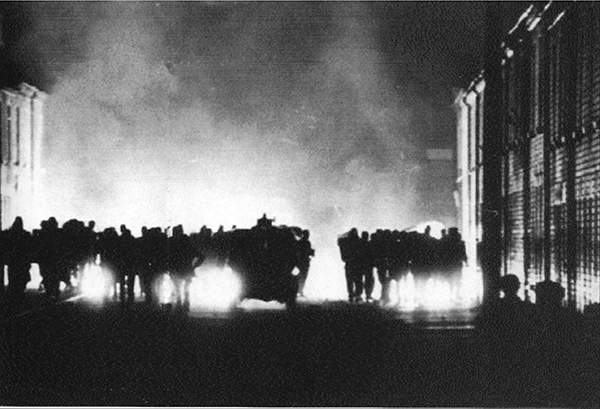
Above: A line of RUC men and B-Specials moves along Hooker Street in Belfast’s Catholic Ardoyne area on the night of 14/15 August 1969, backlit by the fires of loyalist arsonists. Charles J. Haughey was one of a four-man Northern Ireland subcommittee established by the Irish government on 16 August in response to the unrest. (Belfast Telegraph)
Captain James Kelly
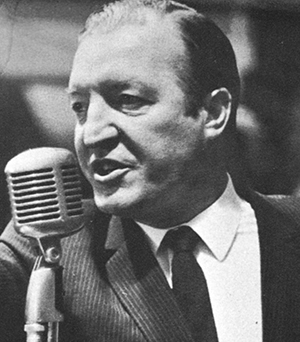
Above: Charles J. Haughey—combined his role on this new subcommittee with control of a special Northern Ireland relief fund of £100,000 to provide ‘aid for the victims of the current unrest in the Six Counties’. (Irish Times)
Before any possible plans could be put in place to supply weapons, Haughey realised that a line of communication must be opened between the Irish government, under the auspices of the Northern Ireland subcommittee, and those Northern republicans on the ground. On the suggestion of Col. Michael Hefferon, director of Irish Military Intelligence (IMI), the name of a young officer on his staff, Captain James Kelly, was put forward as a possible intermediary.
Captain Kelly had been in Northern Ireland when the violence first broke out in August 1969, experiencing at first-hand the chaotic nature of events. Significantly, in one report during the summer riots in Belfast, following discussions with John Kelly (no relation but a leading figure in the citizens’ defence committees springing up throughout Belfast at this time), Captain Kelly advised that the Irish government should provide monies to John Kelly in order to purchase guns and ammunition. Captain Kelly later testified to the Public Accounts Committee (established to examine the Arms Crisis) in 1971 that his recommendation to arm Northern republicans met with Haughey’s expressed approval.
Not only had Haughey opened a line of communication with leading republicans in Belfast and elsewhere through his relationship with Captain Kelly but he had also allegedly held secret discussions during August/September 1969 with the IRA’s chief-of-staff, Cathal Goulding, or Mick Ryan, O/C of the Dublin Brigade of the IRA (and later quartermaster general of the IRA).
According to the Irish Special Branch, which had apparently placed Haughey under surveillance in and around August/September 1969, ‘a deal had been made’ between an unnamed Irish government minister (believed to be Haughey) and a senior IRA figure (Goulding or Ryan) that the IRA would have a ‘free hand in operating a cross-border campaign in the North’, provided that it called off its campaign of violence in the Irish Republic. According to Garda intelligence, Haughey even supplied the IRA leadership with £2,500. Haughey subsequently vigorously denied this accusation.
Three attempts to import arms
The first known attempt to supply Northern republicans with weapons involved John Kelly and Pádraig ‘Jock’ Haughey, the minister’s older brother (according to John Kelly, during this period Jock reportedly supplied Goulding with two boxes of weapons). In November 1969 they travelled to London to meet a purported arms dealer, Captain Markham Randall, and £11,450 was provided to purchase an arsenal of weapons via a Baggot Street Munster & Leinster Bank account under the name of ‘George Dixon’. The arranged deal, however, fell through when Kelly became suspicious, believing Captain Randall to be a British spy.
The following month, in mid-December 1969, there was a further attempt to import guns, this time from the United States. On this occasion John Kelly, by Neil Blaney’s ‘express orders’, travelled to the USA to ‘ascertain how quickly arms would be available in New York from the Irish-American community’. This venture failed, however, owing to insufficient funding and Blaney’s preference for the purchase of guns from continental Europe rather than the USA.
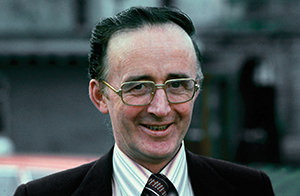
Above: Captain James Kelly—admitted his role in the attempts to import arms but always maintained that he was implementing government policy. (Victor Patterson)
The third attempt to import guns occurred during the early months of 1970. On this occasion, with the support of Blaney and Haughey, the importing of weapons was to be carried out under the supervision of Col. Hefferon, director of IMI. Significantly, Hefferon believed that he was working under the direct orders of the Northern Ireland subcommittee and thus that his actions had the endorsement of the Irish government. Blaney contacted Otto Schleuter, a professional arms dealer based in Hamburg. Using Captain James Kelly as a go-between, Blaney also employed the services of Albert Luykx, a Belgian-born businessman who ran a restaurant in Sutton, Co. Dublin.
In mid-February 1970 Captain Kelly made arrangements to travel to the Continent to inspect an arms shipment, bringing with him £10,000 drawn from the ‘George Dixon’ account in the Munster & Leinster Bank. The deal was to consist of ‘200 sub machine guns, 84 light machine guns, 50 general purpose machine guns, 50 rifles, 200 grenades, 70 flak jackets and 250,000 rounds of ammunitions and 200 pistols’. Kelly met Schleuter in Antwerp, where arrangements were made to ship the aforementioned ‘cargo’ to Dublin. To the frustration of the conspirators, however, when the ship assigned to transport the consignment, The City of Dublin, docked in Dublin on 25 March, the arms and ammunitions were not on board; the consignment had been impounded in Antwerp owing to the lack of an ‘end user’s certificate’.
Intervention of Peter Berry
The following month, April 1970, in a last-ditch attempt to procure weapons, Captain Kelly travelled to Hamburg and, with the support of Schleuter, put plans in place to bring the arms consignment to Dublin on a scheduled Aer Lingus flight. When it became apparent that international regulations did not permit the transportation of firearms, Captain Kelly approached John Squires, managing director of a charter subsidiary of Aer Lingus. Once again, however, this attempt failed owing to legal considerations.
It was at this juncture that Peter Berry, secretary at the Department of Justice, was made aware of the unfolding débâcle. According to Berry’s personal account of events (later reproduced in Magill magazine in the early 1980s), during a telephone conversation on the evening of Saturday 18 April he informed Haughey that the guns would be seized by the Irish Special Branch if the attempted shipment arrived at Dublin Airport (at this stage Berry was unaware of the extent of Haughey’s involvement in the affair). On hearing Berry’s words, Haughey noted that ‘I had better have it called off’. The following day, on 19 April, Captain Kelly received confirmation that Haughey had decided to call an immediate halt to the attempted importation.
Ministerial denials, sackings and arrests
Several days later, on 29 April, Taoiseach Jack Lynch summoned Blaney to his office. Lynch made it clear that he knew all about the covert plans to import weapons and demanded Blaney’s ministerial resignation (it remains unclear exactly when Lynch was first made aware of the Blaney/Haughey conspiracy). Blaney vigorously protested his innocence and refused to resign.
Later that day, Lynch visited Haughey at the Mater Hospital, where he was recovering from what he claimed were injuries caused by falling from his horse. (Rumour at the time had it that he had been badly beaten with an iron bar during an altercation in a public house on the morning of 22 April.) Haughey also protested his innocence. Lynch felt that he could not continue his meeting with the frail minister, who was reportedly in a ‘very weak, sedated state’.
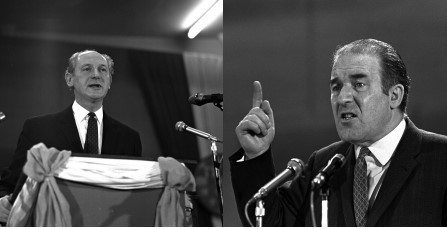
Above: Taoiseach Jack Lynch and Neil Blaney speaking at the Fianna Fáil Ard Fheis in January 1970. On 29 April Lynch summoned Blaney to his office and demanded his resignation, but it remains unclear exactly when Lynch was first made aware of the plan to import arms. (RTÉ Stills Library)
As Lynch considered the fate of his ministers, events outside his control forced his hand. On 5 May 1970 Liam Cosgrave, leader of Fine Gael, received a tip-off about the plot to import guns. Later that evening, Cosgrave confronted Lynch about this information. Thereafter Lynch again met Blaney and demanded his resignation. Blaney again refused. Lynch then phoned Haughey in hospital. He too refused to resign.
Returning home, Lynch consulted a small number of his closest circle of advisers. The following morning, 6 May, the Irish Government Information Bureau issued a statement announcing the sacking of Blaney and Haughey for their alleged involvement in an illegal attempt to import weapons. It was an astonishing turn of events. In the space of two days the Fianna Fáil government had lost three of its ministers (Lynch having also forced the resignation the previous day of Minister for Justice Michael Moran, who was understood to have a ‘serious drink problem’).
Events reached a crescendo on 28 May 1970. Following Haughey’s arrest and transfer to the Bridewell at noon, the disgraced former minister was charged ‘with conspiring to import arms illegally into the State’ contrary to Section 17 of the Firearms Act (1925), as amended by Section 21 of the Firearms Act of 1964. After being cautioned Haughey replied, ‘Not guilty’. Soon after, he appeared before District Justice Good in Court No. 4. Despite opposition from the Gardaí, the district justice agreed to grant Haughey bail on his own bond of £500, with one independent surety of £1,000. Neil Blaney, John Kelly, Captain Kelly and Albert Luykx were also arrested and charged. On 2 July the charges against Blaney were dropped. District Justice Dónal Kearney determined that there was ‘not enough evidence linking the former minister to the specific charge of conspiring to import weapons between 1 March and 24 April’.
Collapse of the first Arms Trial
The first Arms Trial commenced in the Central Criminal Court on 22 September 1970. Haughey and his three co-accused pleaded their innocence. Séamus McKenna, senior council for the State, commenced proceedings by focusing on Haughey’s telephone conversation with Peter Berry on 18 April, which concerned the request for security clearance for the cargo due to come into Dublin Airport. McKenna argued that this phone call was ‘of paramount importance’, the ‘final act in a conspiracy in which the accused jointly and illegally agreed to import weapons and ammunition, in contravention of the Firearms Acts’. Captain Kelly, John Kelly and Luykx all admitted their role in the attempts to import arms; they claimed, however, that their actions were not illegal or covert but had been sanctioned by the Irish government and facilitated through Haughey, Blaney and Jim Gibbons, Minister for Defence.
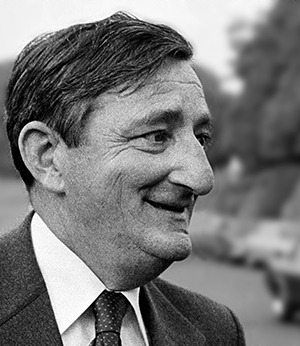
Above: Minister for Defence Jim Gibbons. At the second trial Justice Séamus Henchy observed that either he or Haughey had committed perjury. (Victor Patterson)
Haughey had a different strategy. His defence team sought to dispel the argument that he was aware of attempts to import weapons into the state. Haughey’s evidence directly contradicted four witnesses, including Peter Berry. During cross-examination by the prosecution, Haughey accepted that he did try to arrange the importation of cargo through Dublin Airport, but he argued that he only did so to facilitate military intelligence and because he was under the ‘clear impression that the shipment was required under the contingency plans agreed by the government’. He maintained that at no time was he aware that the mentioned cargo included arms or ammunition.
Jim Gibbons next entered the fray. His evidence was crucial. Under the terms of the indictment, the prosecution had to prove that the attempts to import weapons were illegal because the Minister for Defence played no role in the matter. Under oath, Gibbons categorically denied that he ever agreed to sanction, or even support, attempts to import weapons.
On 29 September 1970 the first Arms Trial dramatically and unexpectedly collapsed, following Justice Aindrias Ó Caoimh’s withdrawal from the case.
Second Arms Trial
The second Arms Trial commenced on 6 October 1970. It was a trilling spectacle. On 19 October Haughey addressed the court for the first time. Under oath, and in accordance with his arguments during the first trial, Haughey said that at all times he had operated in the best interests of the state and that in his capacity as chairman of the Northern Ireland subcommittee he had always ensured that monies designated to help alleviate the distress of Northern Catholics were dispersed appropriately. He vigorously denied that he had any knowledge that monies were misappropriated to help arm Northern republicans.
On 23 October Haughey was acquitted; the jury took less than two hours to come to its decision. The verdict was apparently determined by Gibbons’s admission that Captain Kelly had told him of attempts to import arms and a ‘wider sense that the plot was an understandable response to the plight of Northern Catholics’. In the end, the jury found it difficult to accept that the arms importation did not have at least covert government sanction. In arriving at an acquittal verdict, the jury concluded that the four accused had ‘operated under properly delegated authority’. Haughey felt vindicated. Nonetheless, considering Justice Séamus Henchy’s observation that either Haughey or Gibbons had committed perjury, the trial cast a long shadow over Irish democracy.
To this day Haughey’s role in the Arms Crisis continues to fascinate. In truth, there will never be a definitive account of his involvement. The three investigations charged with examining the Arms Crisis—the two trials in 1970 and the Dáil Committee of Public Accounts in 1971—failed to arrive at any concrete conclusions about what had occurred, and more specifically about Haughey’s involvement.
Stephen Kelly is Associate Professor in Modern History and Head of History, Politics and International Relations at Liverpool Hope University. His forthcoming monograph, Margaret Thatcher, the Conservative Party and the Northern Ireland conflict, 1975–1990, will be published by Bloomsbury Press in January 2021.
FURTHER READING
M. Heney, The Arms Crisis of 1970: the plot that never was (London, 2020).
J. Kelly, The thimble riggers: the Arms Trials of 1970 (Dublin, 1999).
S. Kelly, ‘A failed political entity’: Charles J. Haughey and the Northern Ireland question, 1945–1992 (Newbridge, 2016).
J. O’Brien, The Arms Trial (Dublin, 2000).
















